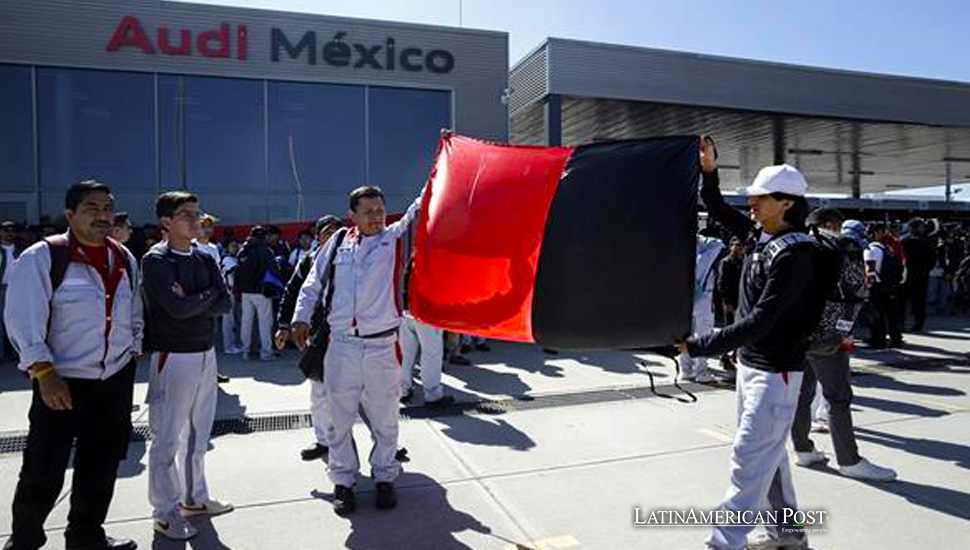End of Audi Strike in Mexico Marks Victory for Workers and Reflection of Labor Reform

Mexican President Andrés Manuel López Obrador heralded the resolution of Audi’s strike in Mexico. This significant labor movement concluded on January 24 with a landmark 10.2% salary and benefits increase, showcasing the impact of Mexico’s labor reforms under the USMCA.
A Triumph for Workers: Audi Strike Resolution
The resolution of the Audi workers’ strike in Mexico, culminating in a substantial 10.2% increase in wages and benefits, not only marks a pivotal moment for the automotive industry but also reflects the broader labor transformation unfolding across Latin America. This significant labor dispute, which began on January 24, ended on a note of victory for workers, signaling a new era of labor relations and democratic syndicalism in Mexico.
President Andrés Manuel López Obrador, in a press briefing from Puebla—the central state where the strike took place—commended the peaceful resolution of the conflict. The strike, initiated by the Independent Union of Audi Mexico Workers (Sitaudi), was resolved with over 66% of members voting in favor of the salary agreement. This resolution is particularly noteworthy as it follows previous unsuccessful consultations, highlighting a growing determination among workers to advocate for their rights and fair compensation.
The Audi strike’s resolution is symbolic of the changing landscape of labor rights in Mexico, especially in the context of the United States-Mexico-Canada Agreement (USMCA), which came into effect in 2020. The agreement includes stringent labor provisions aimed at improving workers’ rights, including the freedom to organize and the enforcement of labor laws. President López Obrador pointed to the strike and its resolution as a manifestation of the labor reforms and the promotion of union democracy envisaged by the USMCA.
Plant-Specific Standoff: Audi’s Premium Manufacturing Plant
The conflict at Audi’s premium manufacturing plant in San José Chiapa, Puebla—Audi’s first luxury car factory in the Americas—began after the company proposed a 6.5% wage increase, significantly less than the 15.5% hike demanded by the employees. The standstill affected the production of over 700 vehicles daily, underscoring the strike’s impact on both the local economy and Audi’s operations in the region.
After intense negotiations, which resumed last week with government mediation, an agreement was reached. The deal comprised a direct 7% increase in salaries plus a 3.2% rise in benefits, a proposal that had to be ratified by the union’s members through a vote. This negotiation process reflects the increased leverage that labor unions in Mexico are beginning to wield, a shift from previous years where employer dominance often dictated terms.
The Audi workers’ strike and its resolution come at a time when labor movements across Latin America are gaining momentum, driven by a demand for better wages, working conditions, and the right to unionize freely. Mexico’s labor landscape, in particular, has been under international scrutiny, especially from its USMCA partners, to ensure that it upholds the labor standards stipulated in the trade agreement.
This strike is the second instance within a year where workers in Mexico’s automotive industry have secured a double-digit wage increase, following a similar agreement reached by the Independent National Union of Workers of the Automotive Industry and General Motors plant in Silao, which agreed to a 10% raise in March. These developments are indicative of a broader trend towards greater worker empowerment and labor rights enforcement in the country.
The successful resolution of the Audi strike not only benefits the workers and their families but also sets a precedent for future labor negotiations in Mexico and potentially across Latin America. It highlights the importance of government mediation in labor disputes, the power of collective bargaining, and the positive role that international trade agreements can play in advancing labor rights.
As Mexico and other Latin American countries continue to navigate the challenges of economic development, social inequality, and labor rights, the Audi strike serves as a beacon of what can be achieved when workers unite in pursuit of fair treatment and just compensation. It also underscores the critical role of labor reform in creating a more equitable and democratic society where the rights of workers are protected and their voices heard.
Government Mediation and Collective Bargaining: Key Factors in Resolution
In the broader context of Latin America’s labor movements, the Audi strike in Mexico exemplifies the growing assertiveness of workers and unions in challenging longstanding inequalities and advocating for their rights. This movement, and others like it, not only aims to improve conditions for workers within specific companies or industries but also seeks to influence broader social and economic policies that affect the working class across the region.
Also read: Volkswagen Bolsters Latin American EV Market with $1 Billion Investment in Mexico
The end of the Audi strike is a milestone in Mexico’s labor history, marking a moment of triumph for workers and a testament to the effectiveness of labor reforms under the USMCA. As Mexico and its Latin American neighbors continue to evolve their labor landscapes, the lessons learned from this strike will undoubtedly inform future negotiations and reforms, paving the way for a more just and equitable labor market.





